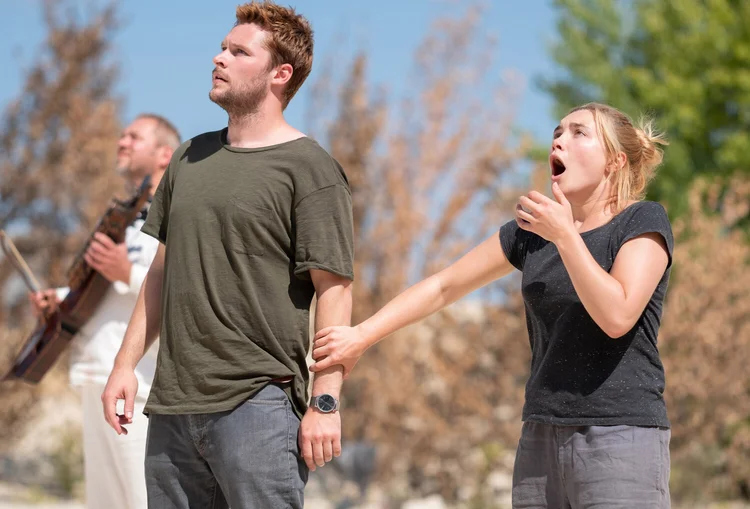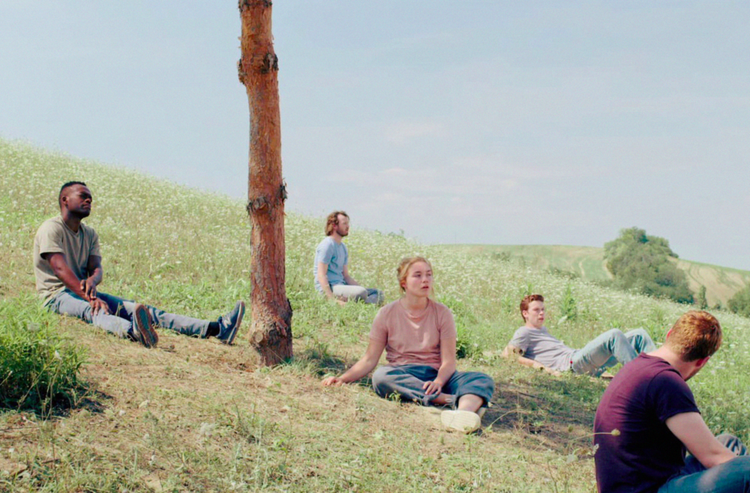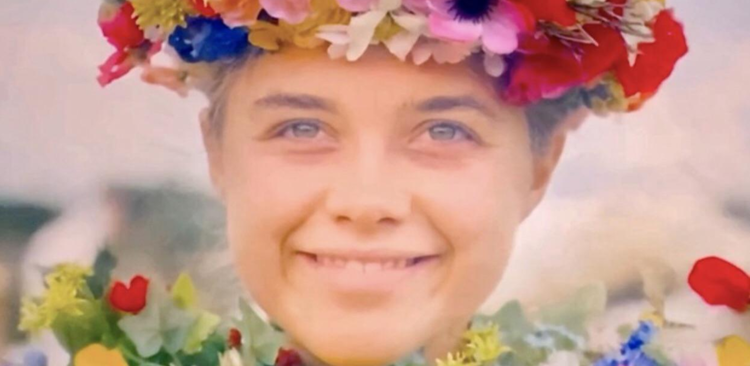Taking The Metaphor Approach, How Midsommar Fucked Me Up.
By Brandon Topp.
It might be unoriginal to begin an analysis by saying, “If you view it as a metaphor,” but fuck it. There’s fun in opening these things up and drawing parallels between a narrative and how life is actually lived.
The latest Ari Aster film Midsommar is a dream in many ways, and considering the inspiration for that dream helps clarify some of the ideas present in the story.
This piece is for those who have seen the movie, so there will be spoilers. Walking out of a film rife with disturbing gore, anxiety-inducing music, and brutal deaths for most of its main characters, viewers of Midsommar have been saying things like, “I don’t think it’s that scary,” and, “I think that was a happy ending,” and, “That made me feel so weird.”
On the surface, the content of the movie and the reactions its evoked makes little sense. My interpretation of the film breaks down as follows, with the overall takeaway being that it’s a film saying you have to experience the darkest before you can see any glimpse of dawn.
Midsommar is A Folk-Horror Breakup Movie

In discussing Midsommar, writer-director Ari Aster calls it both a folk horror film, and a breakup movie. In my opinion, the folk horror comes through in a mesmerizing style visible in the location, the inspired lore of the village and its customs, as well as the haunting orchestral score. On the other hand, the breakup is the structure of the entire story. This is where my interpretation of the meaning behind Midsommar’s unfolding begins to lean towards metaphorical.
Towards the end of a lot of relationships, you end up staying with it for reasons that replace genuine love and attraction—comfort, stability, or trying to be a good person. The central relationship of the film between Florence Pugh’s Dani and Jack Reynor’s Christian is heightened to the most extreme level off the bat, when Dani’s sister kills herself and their parents.
That context is the style of Midsommar, but adding to it, we begin with a couple whose flame is already dwindling. This sets us up for a heartbreaking dive that funnels through a surreal fantasy.
Facing Your Worst Fears

Leading up to a breakup, relationships can linger past a healthy point because you begin to imagine all of your worst fears. Among the most common ones are visions of being totally alone, seeing your lover loving someone else, and having to truly let go—letting that person, and your vision of a life with that person die in your mind.
The way I interpreted the story, Aster put his main character Dani through all of these fears to portray the process of getting through a breakup.
Considering the fear of being alone, Dani’s alone this whole fucking movie. Her boyfriend puts her in a bubble from the outset, and when she has freakouts on the plane and on their first mushroom trip, she retreats to privacy because nobody can understand what she’s been through. This weirdly preps her to get over Christian.
In terms of seeing your lover loving someone else, Dani stumbles through this universal nightmare in a couple of ways. The less obvious is Dani seeing Christian’s approach to his thesis. By stealing an idea from Josh, and sort of mimicking his research attempts, Christian unveils this desire to be someone other than who he his—a person who is self-pitying, and who happens to be dating Dani. The more obvious way this fear manifests is when Dani actually whitnesses Christian having sex with a teenager through a keyhole, several naked women of all ages standing arond them chanting and moaning.
Going through her experiences of losing her family, watching others die in front of her eyes in Hälsingland are intense, dreadful experiences. Then seeing Christian forget her birthday, refuse to leave the village with her, and then cheat on her was all preparation—Dani endures the worst fears of her life and relationship throughout the story.
The Ayahuasca Effect

I’ve never done ayahuasca, but there feels like a general correlation here. A lot of people who have taken the psychedelic describe it as a period of death and rebirth. The death part can be dark, painful, terrifying, etc. But the general idea seems to be, you come out of that experience free of those negative influences simply by virtue of having faced them.
To me, that type of effect is what inspires the smile on Dani’s face at the close of the film. She saw all of her darkest fears build and build until they burst. At that point, when everything hit its most dizzying and anxiety-inducing—Christian running naked to his capture, Dani wallowing echoed by a team of women on the floor—could she finally let go. She could finally kill Christian, and in metaphorical terms, kill the idea that he was the one, or that they would last.
*BTW, there was no ayahuasca usage in this film, but the above image is lifted from a mushroom trip scene that I have to compliment for being one of the realest visual depictions of a trip I’ve ever seen. These experiences are always cartoonified to an unbelievable place in film, and this scene was refreshing.
You Don’t Feel Bad or Afraid, But You Feel Like You Should

Walking out of that movie, it feels like a happy ending, because it’s not real and Dani needed to get out of that relationship. Even though our eyes and ears just saw murder, carnage, and pure terror from the characters on screen, our souls feel catharsis because we’re with our main character and we’re out and we’re free.
What fucked me up was how many of us have been on both sides of it. How we felt the deep dread of Dani going to watch Christian having sex, and the elation of watching it all burning to the ground. If a metaphor, I think this movie is a chillingly relevant-yet-fantastical one. The process of love so often ends with our hearts growing so sour and combative, and though its own small circle of life, it’s scary to go through and sad to look back on.











3 Comments